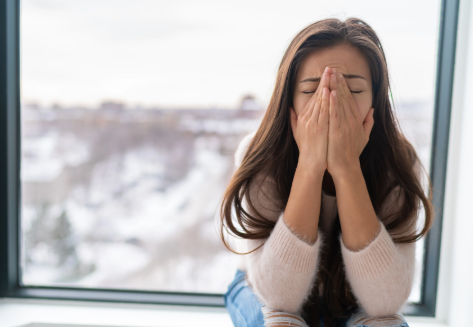How to Prevent Anxiety Attacks: A Guide to Staying Calm

If you’ve ever experienced an anxiety attack, you know how overwhelming it can feel. The racing heart, shortness of breath, and spiraling thoughts can seem to come out of nowhere. But the good news is that anxiety attacks are preventable. With a mix of self-awareness, healthy habits, and the right tools, you can take control and stop anxiety before it takes over. Let’s break down how to prevent anxiety attacks in a way that feels manageable and empowering.
Understanding Anxiety Attacks
Before we dive into prevention, let’s talk about what anxiety attacks actually are. Anxiety attacks (also called panic attacks) are sudden episodes of intense fear or discomfort. They happen when your body’s fight or flight response goes into overdrive, even if there’s no real danger. Symptoms often include:
-
Physical symptoms: Rapid heart rate, shortness of breath, chest tightness, dizziness, or sweating.
-
Mental symptoms: Fear of losing control, feeling detached, or an intense sense of doom.
Knowing what’s happening in your body is the first step in preventing these episodes.
1. Recognize Your Triggers
Anxiety attacks often have triggers—situations, thoughts, or physical sensations that set off the body’s stress response. Common triggers include:
-
High-stress situations like exams or work deadlines.
-
Overthinking or dwelling on negative thoughts.
-
Lack of sleep or poor eating habits.
-
Caffeine or alcohol consumption.
By identifying your personal triggers, you can start to create a plan to address or avoid them.
How to Take Action:
Keep a journal to track when you feel anxious or on edge. Write down where you were, what you were doing, and how you felt. Patterns may emerge over time.
2. Practice Deep Breathing
One of the simplest and most effective ways to prevent an anxiety attack is to calm your nervous system with deep breathing. When you breathe deeply, you activate your body’s parasympathetic nervous system, also known as the "rest and digest" system. This helps counteract the sympathetic nervous system, which causes your fight or flight response.
Try This Exercise:
-
Inhale deeply through your nose for 4 counts.
-
Hold your breath for 4 counts.
-
Exhale slowly through your mouth for 6 counts.
-
Repeat for a few minutes until you feel calmer.
3. Stay Physically Active
Regular physical activity isn’t just good for your body—it’s amazing for your mind. Exercise helps lower stress hormones like cortisol and releases feel-good endorphins that naturally reduce anxiety. Plus, it keeps your heart and lungs healthy, making you less likely to feel overwhelmed by the physical sensations of anxiety.
How to Get Moving:
You don’t need to run a marathon. Activities like walking, yoga, swimming, or dancing can work wonders for stress relief. Aim for at least 30 minutes a few times a week.
4. Create a Grounding Routine
When you feel stressed or anxious, having a routine to bring yourself back to the present can make a huge difference. Grounding techniques work by shifting your focus from your mind to your body and surroundings.
Try the 5-4-3-2-1 Method:
-
Name 5 things you can see.
-
Name 4 things you can touch.
-
Name 3 things you can hear.
-
Name 2 things you can smell.
-
Name 1 thing you can taste.
This exercise helps break the cycle of anxious thoughts and calms your nervous system.
5. Prioritize Sleep
Sleep is crucial for managing stress and anxiety. When you’re well-rested, your brain is better equipped to handle challenges without triggering an anxiety attack. On the flip side, lack of sleep can make you feel irritable, emotional, and more vulnerable to anxiety.
Sleep Tips:
-
Stick to a regular bedtime and wake-up schedule.
-
Avoid screens an hour before bed to help your brain wind down.
-
Create a calming bedtime ritual, like reading or practicing relaxation techniques.
6. Watch What You Eat and Drink
What you put into your body has a direct impact on how you feel. Some foods and drinks can worsen anxiety, while others can help you stay calm.
Avoid:
-
Caffeine, which can mimic the physical symptoms of anxiety (like a racing heart).
-
Alcohol, which can mess with your sleep and mood.
Include:
-
Whole grains, fruits, and veggies for steady energy.
-
Foods rich in magnesium, like spinach and nuts, which help regulate the nervous system.
-
Herbal teas, like chamomile or peppermint, for their calming effects.
7. Seek Support When You Need It
You don’t have to deal with anxiety alone. Reaching out to friends and family or joining a support group can provide comfort and perspective. For deeper struggles, working with a mental health professional can help you develop long-term strategies to manage your anxiety.
Consider Therapy Options:
-
Cognitive Behavioral Therapy (CBT): A proven method for changing anxious thought patterns.
-
Talk therapy: Simply sharing your feelings with a professional can reduce their intensity.
8. Practice Self-Compassion
Anxiety can feel overwhelming, but beating yourself up for it only makes things harder. Instead, remind yourself that anxiety is just your brain trying to protect you—it’s not your fault, and it doesn’t define you.
How to Be Kind to Yourself:
-
Write down positive affirmations, like, "I’m doing my best, and that’s enough."
-
Spend time on activities that bring you joy, like hobbies, music, or art.
9. Have a Backup Plan for Stressful Situations
Sometimes, anxiety strikes even when you’ve done everything to prevent it. Having a plan for these moments can help you feel more in control.
Prepare Your Toolkit:
-
A calming playlist or podcast.
-
A go-to grounding exercise.
-
Your favorite herbal tea or an icalm stress relief shot.
Why Choose icalm?
When anxiety feels like it’s taking over, icalm stress relief shots can help. These all-natural shots are packed with scientifically proven ingredients to calm your nervous system and help you find your center. Whether you’re gearing up for a stressful event or recovering from a tough day, icalm is there to support you.
Take one shot, breathe deeply, and let the stress melt away. Visit icalm.com to learn more about how icalm can be your partner in relieving stress and reclaiming calm.
Final Thoughts
Preventing anxiety attacks isn’t about being perfect—it’s about finding what works for you and building habits that support your mental health. From deep breathing and exercise to reaching out for support, these small changes can make a big difference. And remember, when stress feels too heavy, icalm stress relief shots are here to help you calm your nervous system and face the day with confidence. You’ve got this!









Leave a comment